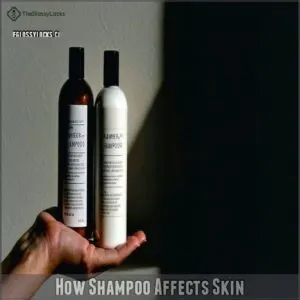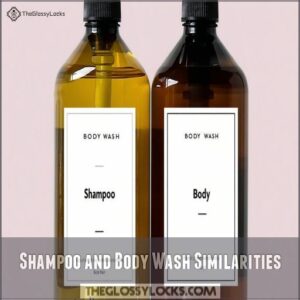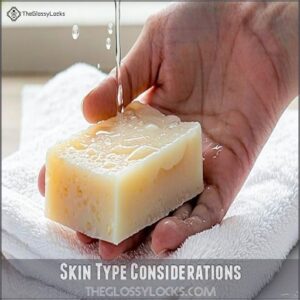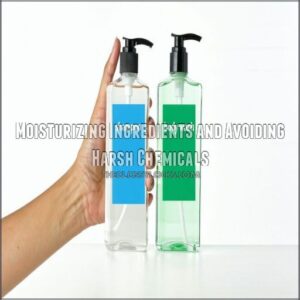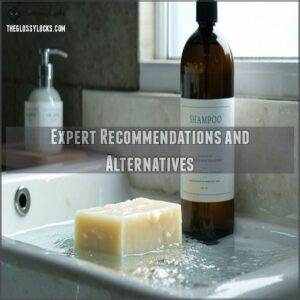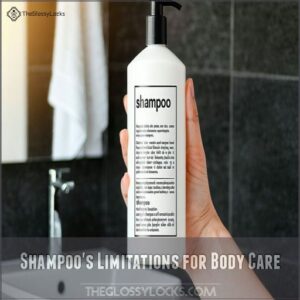This site is supported by our readers. We may earn a commission, at no cost to you, if you purchase through links.
 You might wonder if you can use shampoo as body wash.
You might wonder if you can use shampoo as body wash.
While it’s not ideal, you won’t implode if you do it occasionally.
Shampoos and body washes have different pH levels—shampoos are formulated for hair, which means they could dry out your skin or lead to irritation over time.
Experts suggest sticking to products designed for your skin, as they contain moisturizing ingredients that keep you feeling fresh and irritation-free.
Plus, you never know—using the wrong product might just make your skin feel more like a cactus than silk.
Curious about better alternatives?
There are plenty more skin-friendly options ahead!
Table Of Contents
- Key Takeaways
- Shampoo and Body Wash Differences
- Can You Use Shampoo as Body Wash
- Risks of Using Shampoo as Body Wash
- How Shampoo Affects Skin
- What to Use if You Don’t Have Body Wash
- Shampoo and Body Wash Similarities
- Choosing The Right Product for Your Skin
- Shampoo’s Limitations for Body Care
- Expert Advice and Alternatives
- Final Takeaway and Best Practices
- Frequently Asked Questions (FAQs)
- Is body wash better than Shampoo?
- Can you use shampoo if you run out of body wash?
- Should you use shampoo on your skin?
- What happens if you use shampoo as a body wash?
- Can body wash be used as shampoo?
- Is shampoo a good substitute for body wash?
- Is it okay to wash your body with shampoo?
- Can I substitute shampoo for body wash?
- Is there a difference between shampoo and body wash?
- Can I use conditioner as body wash?
- Are multipurpose shampoo-body wash products effective?
- Can shampoo cause allergic skin reactions?
- Is shampoo suitable for sensitive skin?
- Does shampoo remove body odor effectively?
- How often can you use shampoo on body?
- Conclusion
Key Takeaways
- You shouldn’t use shampoo as body wash regularly, as it can dry out your skin and cause irritation. Shampoo’s pH is different from your skin’s, and it lacks moisturizing ingredients.
- If you’re out of body wash, a face wash is a better alternative than shampoo. Cetaphil Cream to Foam Face Wash, for instance, is a hydrating gentle cleanser. Face washes are gentler on your skin and formulated for its needs.
- While some medicated shampoos can treat specific skin conditions, this isn’t a reason to use regular shampoo on your body.
- Always prioritize using products specifically designed for your skin type to maintain its health and avoid irritation.
Shampoo and Body Wash Differences
While you might think shampoo and body wash are interchangeable since they both clean, they’re actually designed with different pH levels and ingredients for specific purposes.
Your hair needs stronger surfactants to remove oil and dirt, while your skin requires gentler cleansers with moisturizing ingredients like glycerin to maintain its natural barrier.
Formulations and PH Levels
Your shower essentials might look similar, but shampoo and body wash are more different than identical twins.
While shampoo typically maintains a lower pH to protect your hair’s natural oils, body wash rocks a higher pH that’s perfect for your skin’s acid mantle.
Here’s what sets them apart:
- Shampoo’s pH ranges from 5.5-7.0, focusing on oil removal
- Body wash sits at 6.0-8.0 pH, preserving skin barrier
- Different surfactant concentrations create unique cleansing actions
Skin and Hair Care Requirements
Hair and skin have drastically different cleansing needs.
While your scalp produces natural oils that require stronger cleansers to remove buildup, your body’s skin maintains a delicate pH balance that’s easily disrupted.
Think of it like this: your hair can handle a deep scrub, but your skin needs a gentler touch.
That’s why shampoos pack more cleaning power, while body washes focus on preserving your skin’s natural barrier.
Surfactants and Skin-Loving Ingredients
Through the lens of skin chemistry, surfactants and skin-loving ingredients play distinct roles in shampoo versus body wash formulations.
While both products contain cleansing agents, body wash typically includes:
- Lower concentrations of harsh surfactants to protect skin’s barrier
- Moisture-binding glycerin for hydration
- Natural oils that replenish skin lipids
- Barrier-repair proteins that maintain skin health
Understanding these differences helps you make informed choices about which product best serves your skin’s needs.
Can You Use Shampoo as Body Wash
While you might be tempted to reach for your shampoo when you’re out of body wash, scientific evidence shows this swap can disrupt your skin’s natural pH balance and protective barrier.
You’ll find some rare exceptions where shampoo works on your body, such as using medicated versions for specific skin conditions, but it’s not a long-term solution for everyday cleansing.
Rare Exceptions for Bald Heads
While most people need different products for their hair and body, those with shaved or bald heads have unique options.
If you’re rocking the smooth dome look, you’ll be glad to know that body wash works perfectly fine for your scalp.
The skin on your head responds well to the gentler formulation of body wash, which helps maintain your scalp’s natural pH balance and moisture levels.
Medicated Shampoos for Tinea Versicolor
Beyond everyday hygiene, certain medicated shampoos can actually double as effective body washes, especially for treating Tinea Versicolor.
Some medicated shampoos, like coal tar shampoos for scalp conditions, have active ingredients that help with skin cell growth and flaking.
You’ll find relief with over-the-counter options like Nizoral 1% shampoo or Selenium Sulfide shampoo.
Simply apply these medicated shampoos to affected areas during your shower routine.
Let them sit for 5-10 minutes before rinsing for best results.
Just remember to moisturize afterward.
Risks of Using Shampoo as Body Wash
You’ll find that your skin’s natural pH balance takes a hit when you swap your body wash for shampoo, leading to irritation and inflammation over time.
While it’s tempting to use that bottle of shampoo when you’re out of body wash, you’re risking dryness and potential allergic reactions since shampoos contain harsher cleaning agents designed for your scalp, not your skin.
Disrupting Skin’s PH Barrier
Despite feeling harmless, using shampoo as body wash disrupts your skin’s delicate pH balance, which typically sits at 5.5.
Think of your skin barrier like a protective shield – when compromised, it can’t defend against environmental stressors.
Here’s what happens when shampoo throws off your skin’s pH:
- Natural oils get stripped away
- Beneficial bacteria decrease
- Moisture escapes more easily
- Cell renewal slows down
Irritation and Inflammation
Using shampoo on your body can trigger a cascade of skin troubles.
When harsh surfactants disrupt your skin’s natural balance, you might notice redness and inflammation that feels like a bad sunburn.
Here’s what happens:
| Symptom | Cause | Solution |
|---|---|---|
| Redness | Harsh surfactants | Switch to body wash |
| Burning | High pH levels | Use pH-balanced products |
| Stinging | Chemical irritants | Choose gentle cleansers |
| Inflammation | Barrier disruption | Give skin a break |
| Itching | Surface irritation | Apply soothing lotion |
Dryness and Allergic Reactions
Regular exposure to shampoo’s harsh surfactants can strip your skin’s natural oils, leading to uncomfortable dryness and flakiness.
If you’ve got sensitive skin, you’re particularly vulnerable to allergic reactions from ingredients like sulfates and fragrances.
You might notice redness, itching, or even painful rashes developing.
While occasional use might seem harmless, it’s best to stick with products specifically formulated for your skin.
How Shampoo Affects Skin
Your skin won’t be too happy if you regularly swap your body wash for shampoo, since shampoo’s harsh surfactants and higher pH levels can disrupt your skin’s natural barrier.
While you might save a few bucks using shampoo as body wash, you’re actually stripping your skin of its protective oils and missing out on the skin-loving ingredients found in proper body cleansers.
Shampoo’s High PH Level
Many shampoos clock in at a pH level between 6 and 7, while your skin prefers a more acidic environment around 5.5.
This mismatch can throw your skin’s natural balance into chaos, much like adding vinegar to milk.
Here’s what happens when you disrupt your skin’s pH:
- Your protective barrier weakens, leaving skin vulnerable to bacteria
- Natural moisturizing factors get depleted faster
- Your skin works overtime trying to restore balance
Harsh Surfactants and Skin Stripping
Shampoo’s harsh surfactants pack a powerful punch – great for your hair but tough on your skin.
These cleaning agents strip away natural oils, leaving your skin barrier vulnerable.
Think of it like using dish soap on fine china – it’ll get the job done, but at what cost?
Your skin needs gentler care to maintain its delicate balance and natural protection.
Lack of Skin-Specific Ingredients
While shampoos strip away oils and dirt, they’re missing key ingredients your skin craves.
You won’t find the moisturizing agents and barrier-supporting compounds that make body wash so effective.
Here’s what you’re missing when you use shampoo on your body:
- Skin-nourishing elements like glycerin and ceramides
- Natural pH balancers that protect your skin barrier
- Specialized emollients that lock in moisture
The result? Your skin misses out on the tender loving care it deserves.
What to Use if You Don’t Have Body Wash
You’ll be glad to know that using a gentle cleanser for sensitive skin, like those featuring hydrating ingredients and soothing ingredients, can be beneficial for skin care. Your face wash can do double duty as an effective body cleanser, since it’s specifically formulated for skin care.
Facial scrub can be used for a deeper clean.
Try using it on key areas like your underarms and feet, as it contains acids that help remove dead skin cells more effectively than shampoo.
Face Washes and Facial Scrubs
Out of body wash? A face wash or facial scrub might be your skin’s new best friend.
These products are specifically designed for skin care, offering gentle, fragrance-free skin care results.
When selecting a face wash, consider your skin type and look for ingredients like ceramides for dry skin, which can help provide hydration and soothe irritation.
| Product Type | Benefits | Best For |
|---|---|---|
| Face Wash | Gentle cleansing | Daily use |
| Facial Scrub | Deep exfoliation | Weekly use |
| Acid-based Wash | Dead skin removal | Targeted care |
Remember to focus on the pits and bits for a cost-effective clean.
Soaps and Shower Gels
Beyond facial products, traditional soap bars and shower gels step in perfectly when you’re out of body wash.
Here’s what makes them smart alternatives:
- Natural soap bars pack sustainable ingredients and travel easily
- Fragrance-free shower gels protect sensitive skin
- Travel-sized soaps fit anywhere and last longer than you’d think
For gentle cleansing, using pH-balanced soothing cleansers is key to break up built-up dirt, oil, and debris on the skin. Both options clean effectively without disrupting your skin’s natural balance, unlike shampoo’s harsher formulas.
Milk Baths and Luxurious Options
Instead of basic soaps and gels, try a luxurious milk bath to pamper your skin.
Mix 2 cups of powdered milk with a handful of bath salts and your favorite essential oils for a spa-like experience.
You’ll get deep moisturizing benefits while the natural lactic acid gently exfoliates.
Plus, aromatherapy from lavender or eucalyptus oils can turn your regular shower into a mini retreat.
Shampoo and Body Wash Similarities
You’ll notice both shampoo and body wash contain similar cleansing ingredients like sodium laureth sulfate, but they’re mixed in different amounts for specific purposes.
While these products share common cleaning agents, their unique formulations target either your hair’s oil-removal needs or your skin’s moisture balance requirements.
Shared Ingredients Like SLES and SLS
While face wash can work in a pinch, let’s look at why shampoo and body wash share more than you might think.
Both products contain sodium laureth sulfate (SLES) and sodium lauryl sulfate (SLS) as key cleansing agents.
These surfactants work by attracting both water and oil, helping to wash away dirt and grime.
Think of them as the cleaning powerhouses in your shower products.
Different Proportions and Concentrations
Shampoos and body washes share similar ingredients, but their proportions tell a different story. You’ll find higher concentrations of cleansing agents in shampoo compared to body wash, which explains why using it on your skin feels harsh. Mixing shampoos can also lead to disruptions in the scalp’s pH balance, as seen when combining shampoos for hair care.
Here’s what makes them different:
- Shampoos pack 2-3 times more surfactants
- Body washes contain 15-20% more moisturizing agents
- pH levels vary considerably (shampoo: 5-7, body wash: 6-8)
- Fragrance concentrations differ by up to 30%
- Preservative systems use different ratios for scalp vs. skin
Unique Formulations for Hair and Skin
Your hair and skin have distinct needs, which is why shampoos and body washes come with unique formulations.
Let’s break down the key differences:
| Feature | Hair Care | Skin Care |
|---|---|---|
| pH Level | 5.5-7.0 | 4.5-5.5 |
| Surfactants | Stronger | Gentler |
| Oil Removal | Aggressive | Moderate |
| Added Benefits | Volume, shine | Moisture, protection |
Think of it like having specialized tools in your cleaning arsenal – each designed for the best performance in its specific role.
Choosing The Right Product for Your Skin
You’ll need to think about your skin type when choosing between body wash and shampoo, as each product contains specific ingredients designed for different purposes.
While body wash contains moisturizing elements like glycerin that protect your skin’s natural barrier, shampoo’s harsh surfactants can disrupt your skin’s pH balance and cause irritation.
Skin Type Considerations
Knowing your skin type is key when choosing between shampoo and body wash.
Just like a fingerprint, everyone’s skin tells a different story.
Think of your skin as a delicate ecosystem that needs the right balance of care.
Here’s what to keep in mind for your skin type:
- Dry skin requires gentler cleansers with lower pH levels
- Oily skin benefits from clarifying formulas
- Sensitive skin needs fragrance-free options
- Acne-prone skin works best with non-comedogenic products
Moisturizing Ingredients and Avoiding Harsh Chemicals
After identifying your skin type, let’s look at what’s actually in your cleansers.
Think of moisturizing ingredients as your skin’s best friends and harsh chemicals as party crashers you want to avoid.
When shopping for gentle cleansers, consider opting for a sulfate free shampoo alternative to reduce irritation and dryness.
| Ingredient Type | Good for Skin | Bad for Skin |
|---|---|---|
| Moisturizers | Glycerin, Aloe | Alcohol, SLS |
| Cleansers | Coconut-based | Parabens |
| pH Balance | 5.5-6.5 | Above 7.0 |
Gentle cleansers with natural moisturizing agents help maintain your skin’s protective barrier, while harsh surfactants can strip away essential oils.
Expert Recommendations and Alternatives
Dermatologists stress the importance of using products that cater to your specific skin type, such as a gentle hydrating cleanser, in order to maintain a healthy complexion. Dermatologists strongly recommend using dedicated products for your hair and body care routine.
"While occasional use won’t harm you, it’s best to stick with products designed for their specific purposes," explains Dr. Sarah Chen, a board-certified dermatologist.
If you’re in a pinch, reach for a gentle face wash instead of shampoo – it’s formulated with skin-friendly ingredients that won’t disrupt your skin’s natural balance.
Shampoo’s Limitations for Body Care
You won’t find skin-loving ingredients like glycerin or barrier repair elements in your shampoo, which means it can’t properly nourish or protect your skin during cleansing.
While shampoo might work in a pinch, its harsh surfactants and higher pH levels can disrupt your skin’s natural balance, leading to dryness and irritation over time.
Ineffective for Skin Cleansing
You’re probably wondering if your shampoo can pull double duty as a body cleanser, but here’s the issue: shampoo’s harsh surfactants are designed to strip oil from your hair, not clean your skin.
In contrast, gentle products like baby shampoo, formulated with gentle detergents, are a better option for those with sensitive skin.
While it might feel like it’s doing the job, you’re actually disrupting your skin’s natural balance.
Think of it like using dish soap to wash your car – technically it cleans, but at what cost?
Lack of Barrier Repair Elements
Beyond basic cleansing, your skin craves specific barrier repair elements that shampoo simply doesn’t provide.
Unlike body wash, which contains key ingredients to maintain skin health, shampoo lacks:
- Biosimilar lipids that mimic your skin’s natural protective barrier – lipids you can find in a lipid body wash,
- Proceramides that boost ceramide production for moisture retention
- Specialized proteins that help repair and strengthen skin structure
Think of it like building a house without the right materials – you need the proper ingredients for lasting protection.
Potential for Skin Damage
Regular shampoo use on your body can wreak havoc on your skin’s natural balance.
Think of your skin as a protective shield – when you disrupt its pH levels with harsh shampoo ingredients, you’re basically leaving the door wide open for irritation, dryness, and even allergic reactions.
The harsh surfactants in shampoo can strip away your skin’s natural oils, potentially leading to long-term damage.
Expert Advice and Alternatives
You might think reaching for shampoo when you’re out of body wash is a clever trick, but experts suggest caution.
Dermatologists recommend using face washes or scrubs as an alternative, which can be gentler and more suited for your skin.
Dermatologist Recommendations
Dermatologists often warn against using shampoo as a body wash, emphasizing potential harm to your skin barrier, especially with sensitive skin.
When in doubt, consider following a dermatologist-recommended routine to keep your skin healthy and balanced.
For healthier product choices:
- Opt for products specifically formulated for your body to avoid skin irritation or allergies.
- Monitor for side effects like skin dryness after use.
- Consult a dermatologist if you notice persistent issues when using shampoo instead of body wash.
Face Washes and Scrubs for Skin Care
When considering alternatives to shampoo for body wash, a good face wash is your ally.
It’s gentle on your skin, offering benefits suited to facial care but versatile enough for body use.
For soft skin, you can even explore products available at Acid face wash stores.
Opt for an acid face wash if you’re into softer, radiant skin.
Facial scrubs, however, offer deep exfoliation, making rough patches vanish like Houdini’s tricks.
Final Takeaway and Best Practices
To keep your skin happy and healthy, it’s best to separate your hair care and body care routines.
If you’ve been reaching for that shampoo when you run out of body wash, remember to monitor your skin’s response and adjust accordingly to avoid irritation.
Separating Hair and Body Care
Two separate products, one for your hair, one for your body—that’s the simplest way to keep both happy.
Shampoos’ role is focused, tackling scalp oil and dirt with hair-specific ingredients.
Body wash benefits include gentler cleansing and a Skin Type Match for your unique needs.
Using shampoo for body might seem economical, but the Product Cost of potential skin irritation isn’t worth the risk.
It’s a small price to pay for healthy skin!
Monitoring Skin Response and Adjusting
Your skin’s like a silent communicator, hinting at its needs—sometimes subtly, sometimes with a shout.
Spotting reactions, like dryness or irritation, means it’s time to reconsider if your shampoo is moonlighting as body wash.
Sensitive skin can be fussy, so listen up.
Switch products and pay attention; your body will thank you for this personalized care journey.
Prioritizing Skin Health and Hygiene
Some folks don’t realize that prioritizing skin health requires the right products.
Moisturizing tips stress using a body wash that cares for sensitive skin. For an overall smooth experience, also consider sensitive skin shaving techniques for sensitive skin.
Keep your skincare routine consistent with targeted product choices—you wouldn’t wear socks on your hands, right?
Keep your skin thriving with dedicated formulas.
Frequently Asked Questions (FAQs)
Is body wash better than Shampoo?
You might think they’re interchangeable, but shampoo and body wash aren’t created equal.
Body wash, with its skin-friendly ingredients and pH balance, often provides better skin care, while shampoo targets oil and pollutants in hair.
Can you use shampoo if you run out of body wash?
Sure, you can use shampoo if you run out of body wash.
It’s not ideal for long-term use since it can dry out your skin.
It’s a quick fix, but check for irritation.
Should you use shampoo on your skin?
Shampoo’s harsh ingredients aren’t designed for your skin. It can strip away natural oils, leading to dryness and irritation. Stick to body wash for a happier, healthier you. Problem solved!
What happens if you use shampoo as a body wash?
Using shampoo as a body wash might leave your skin feeling dry or irritated.
Shampoos are formulated for hair and may upset your skin’s pH balance, leading to potential irritation or stripping of natural oils.
Can body wash be used as shampoo?
You can’t judge a book by its cover—or a body wash by its label—as it’s not made for hair care.
Body wash might clean your scalp, but it won’t give your hair the nourishment it needs.
Is shampoo a good substitute for body wash?
Shampoo isn’t ideal as a body wash substitute.
It’s designed for hair, not skin, and using it regularly can disrupt your skin’s pH, causing irritation.
Save it for emergencies, and use a proper body wash.
Is it okay to wash your body with shampoo?
Washing your body with shampoo might seem convenient, but consistently using it can upset your skin’s pH balance.
This disruption may cause dryness and irritation, so sticking to a body wash is generally wiser for skin health.
Can I substitute shampoo for body wash?
While shampoo can be used as a body wash occasionally, it’s not ideal for regular use.
Shampoo might dry out your skin and disrupt its natural balance, so stick to using body wash for healthier, happier skin.
Is there a difference between shampoo and body wash?
Think of shampoo and body wash as cousins with different jobs.
Shampoo targets scalp oils with specific surfactants, while body wash is gentler, safeguarding your skin’s balance.
Using each as intended keeps both hair and skin happy.
Can I use conditioner as body wash?
Nope, don’t do it!
Conditioner‘s too thick, it won’t rinse well, and it’s not designed for skin.
Stick to body wash for a happy, clean body.
Your skin will thank you.
Are multipurpose shampoo-body wash products effective?
Multipurpose shampoo-body wash products can be effective for those without specific skin or hair concerns.
They’re convenient, offering a quick fix for cleaning both hair and body, but they mightn’t address individual needs in the best way.
Can shampoo cause allergic skin reactions?
Yes, shampoo can cause allergic skin reactions due to fragrances, preservatives, or sulfates.
If you notice itching or redness, try switching products or consult a dermatologist.
It’s like finding the right dance partner for your skin.
Is shampoo suitable for sensitive skin?
Shampoo mightn’t be the best for sensitive skin.
It’s designed for scalps, not bodies, and using it on your skin could upset its balance and cause irritation.
Stick to body washes formulated for skin comfort.
Does shampoo remove body odor effectively?
Think of shampoo as a backup singer in the realm of body odor.
While it can cleanse your skin when needed, it doesn’t effectively neutralize odor like deodorant or body wash.
Regular use may cause dryness.
How often can you use shampoo on body?
Using shampoo on your body occasionally in a pinch is fine, but don’t make it a habit.
It can disrupt your skin’s natural pH balance, leading to dryness and irritation.
Stick to dedicated body wash when possible.
Conclusion
When the question "Can you use shampoo as body wash?" pops up, you might think it’s a quick fix.
It can be in a pinch, but it’s not a savvy swap for your skin’s everyday care.
Shampoo’s different pH and lack of moisturizing ingredients can lead to dryness and irritation.
Stick to body wash or soap for daily use; they’re crafted to keep your skin healthy, feeling smooth, and irritation-free.
Trust experts—your skin will thank you!





